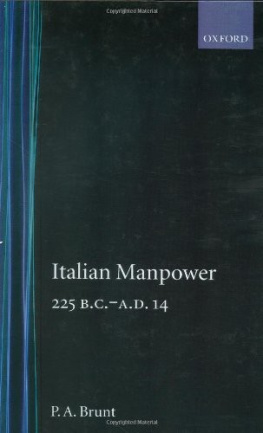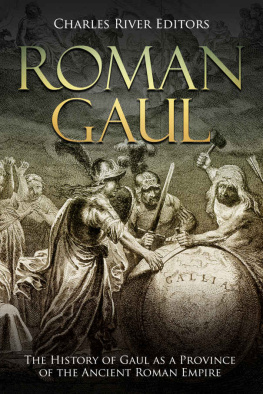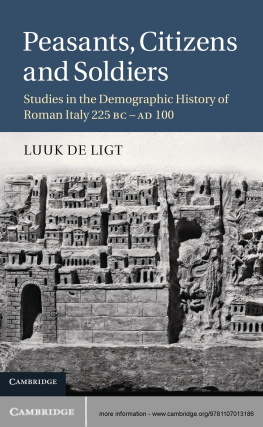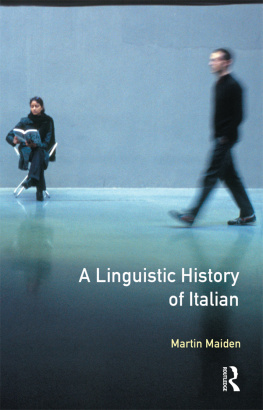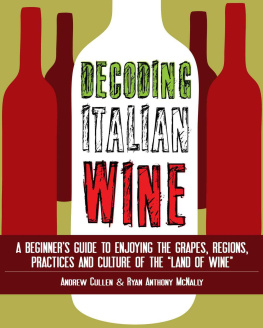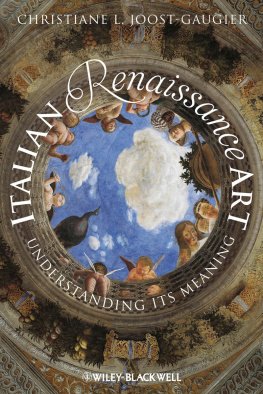PREFACE
WHEN lecturing at Oxford in 1959 on the social and economic conditions of the late Roman Republic, I became aware of the need for a new account of demographic developments in Republican Italy. Although in my view K. J. Beloch had discovered the essential truth as long ago as 1886, his findings had never been expounded in English, and more important, objections to them had not been fully answered, and rival hypotheses, based on erroneous arguments and assumptions, retained a delusive attraction for scholars. Moreover, Beloch himself, while relying in part on evidence about the number of men called up for military service, did not bring out the extent of the burden such service must have imposed on the Italians (unless they were far more numerous than he supposed), and the significance of his population estimates for understanding general conditions in Italy was not appreciated. The society and economy of ancient Italy were moulded by war, with its concomitants of conscription, confiscations, devastations, and endemic violence. It was with the aim of linking the history of Italian population with the consequences of war that I undertook to write this book.
The undertaking was larger than I foresaw. Pope has aptly described the scholar's experience.
Fired at first Sight with what the Muse imparts,
In fearless Youth we tempt the Heights of Arts,
While from the bounded Level of our Mind,
Short Views we take, nor see the Lengths behind,
But more advanced, behold with strange Surprize
New, distant Scenes of endless Science rise!
Th' increasing Prospect tires our wandring Eyes,
Hills peep o'er Hills, and Alps on Alps arise.
New problems continually appeared, distinct from, yet in various ways essentially connected with, those which were my original concern. These connections, along with my main conclusions, I have tried to make plain in the first chapter, and perhaps the reader may find that the book is not such an ill-assorted congeries of material as a glance at its contents might suggest. But it was not easy to devise a title less than a page in length that would fully cover those contents; Italian Manpower has the merit of brevity and was the best, after taking advice, I could think of.
Retarded by teaching, administration, and research in unrelated subjects, the book had to be laid aside for nine months almost every year and
-vii-
sometimes longer. It was almost complete when A. J. Toynbee's vast work, Hannibal's Legacy, was published in 1965. As an admirer of its range, erudition, and lucidity, I was gratified that he had anticipated some of my own conclusions (while leaving something more to be said to confirm them), but was forced to rethink some matters and to take issue with him on many important points.
All this enforced delay, amendment, and enlargement, and delay enabled me to profit by other recent works, though only of those at my disposal by the summer of 1968. (The Addenda, and a few footnotes, refer to some more recent publications.) Probably I have missed much I should have read, but in any event I have aimed to present the ancient evidence rather than to burden the notes with references to scholars who have taken this or that view of a question; where a modern work is cited, it is generally for one of two reasons; it will either be found to contain additional testimony or argumentation, or it will afford the reader the opportunity 'audire alteram partem'. I hope that I have sufficiently acknowledged my more general debts to modern writers, often including those with whom I disagree. It will be clear that I owe most to Beloch. His contributions to Greek and Roman history are well known to all students of those subjects, his eminence in demographic study less familiar to them. Though not published until a generation after his death, his work on the population of medieval and early modern Italy could be regarded by experts as a classic, despite the advance that had been made in the interim in the techniques that historians of population can employ. If any respect is due to the authority a scholar may acquire from wide-ranging studies combined with acumen and prolonged reflection, in this field it belongs to Beloch, and no other is so likely to have had a feeling for the truth, even when the evidence is too meagre for demonstration.
My work rests mainly on literary texts. Perhaps it is too narrowly based; some parts could have been the better for archaeological expertise. I am convinced that it is from archaeology that we can best hope to extend and deepen our understanding of social and economic- conditions in ancient Italy. The investigations already carried out in Apulia and south Etruria by J. Bradford and J. B. Ward Perkins, or under their inspiration, have shown the way, and it is with diffidence that I have ventured to qualify some of the provisional conclusions drawn. We also need more local histories or surveys of the kind admirably essayed by U. Kahrstedt, E. Magaldi, and E. T. Salmon for Magna Graecia, Lucania, and Samnium respectively; it will be of the greatest advantage if the authors of such studies can not only draw on knowledge of the classical evidence, literary and archaeological, and of the topography of the country, but will consider what light may be cast from late antiquity and from medieval and modern times on an earlier age; in so far as we can be sure that the material
-viii-
conditions of life cannot have greatly changed, it may be legitimate to retroject what is only attested centuries later, and local histories may be most valuable, if they bridge the periods conventional in general history.

